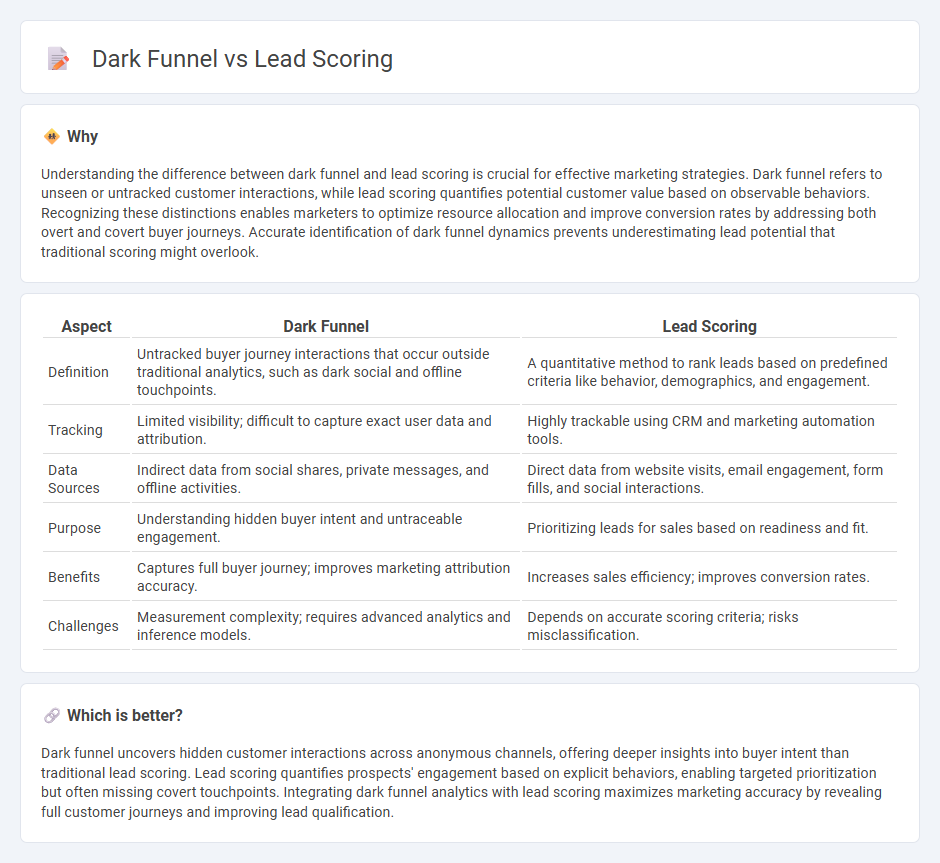
Dark funnel refers to the invisible stages in the buyer's journey where potential customers engage with content without directly revealing their intent, complicating traditional tracking methods. Lead scoring assigns values to prospects based on their behaviors and demographics to prioritize sales efforts effectively. Explore how integrating dark funnel insights with lead scoring enhances marketing precision and drives sales growth.
Why it is important
Understanding the difference between dark funnel and lead scoring is crucial for effective marketing strategies. Dark funnel refers to unseen or untracked customer interactions, while lead scoring quantifies potential customer value based on observable behaviors. Recognizing these distinctions enables marketers to optimize resource allocation and improve conversion rates by addressing both overt and covert buyer journeys. Accurate identification of dark funnel dynamics prevents underestimating lead potential that traditional scoring might overlook.
Comparison Table
| Aspect | Dark Funnel | Lead Scoring |
|---|---|---|
| Definition | Untracked buyer journey interactions that occur outside traditional analytics, such as dark social and offline touchpoints. | A quantitative method to rank leads based on predefined criteria like behavior, demographics, and engagement. |
| Tracking | Limited visibility; difficult to capture exact user data and attribution. | Highly trackable using CRM and marketing automation tools. |
| Data Sources | Indirect data from social shares, private messages, and offline activities. | Direct data from website visits, email engagement, form fills, and social interactions. |
| Purpose | Understanding hidden buyer intent and untraceable engagement. | Prioritizing leads for sales based on readiness and fit. |
| Benefits | Captures full buyer journey; improves marketing attribution accuracy. | Increases sales efficiency; improves conversion rates. |
| Challenges | Measurement complexity; requires advanced analytics and inference models. | Depends on accurate scoring criteria; risks misclassification. |
Which is better?
Dark funnel uncovers hidden customer interactions across anonymous channels, offering deeper insights into buyer intent than traditional lead scoring. Lead scoring quantifies prospects' engagement based on explicit behaviors, enabling targeted prioritization but often missing covert touchpoints. Integrating dark funnel analytics with lead scoring maximizes marketing accuracy by revealing full customer journeys and improving lead qualification.
Connection
The dark funnel represents the untraceable stages of a customer's buying journey, where prospects interact with content and brand assets anonymously, making it difficult to track their behavior. Lead scoring leverages data from visible touchpoints combined with predictive analytics to assign value to leads, compensating for the hidden interactions within the dark funnel. Integrating insights from both concepts enhances marketing strategies by improving lead qualification accuracy and prioritizing high-potential prospects.
Key Terms
Qualification
Lead scoring quantifies prospect engagement by assigning values to actions such as email opens, website visits, and content downloads, enabling precise qualification of sales-ready leads. The dark funnel encompasses unseen buyer behaviors like peer discussions, anonymous content consumption, and offline interactions, which complicate traditional lead qualification but significantly influence decision-making. Explore advanced strategies to integrate dark funnel insights with lead scoring for enhanced qualification accuracy.
Attribution
Lead scoring quantifies potential customer engagement by assigning values based on interactions, aiding marketers in prioritizing prospects with the highest conversion likelihood. Dark funnel attribution addresses the challenge of tracking hidden touchpoints in the buyer's journey, especially anonymous or untraceable interactions that influence decisions without being directly measurable. Explore deeper strategies to enhance your attribution models and optimize lead scoring effectiveness.
Intent Data
Lead scoring quantifies potential customer quality by evaluating explicit signals such as engagement metrics and demographic information, while dark funnel analysis prioritizes intent data from anonymous or untracked interactions to uncover hidden buyer interest. Intent data captures behavioral patterns like content consumption and search queries, offering a deeper understanding of a prospect's readiness to purchase beyond traditional lead qualification models. Explore how leveraging intent data in both lead scoring and dark funnel strategies can significantly enhance your sales funnel accuracy.
Source and External Links
What Is Lead Scoring? Definition, Models, Best Practices - Cognism - Lead scoring assigns points to leads based on their behaviors and attributes to prioritize sales efforts, improving conversion rates by focusing on leads most likely to convert.
Lead scoring - Wikipedia - Lead scoring ranks prospects by perceived value using explicit data (e.g., job title, company size) and implicit data (e.g., website visits), increasing sales efficiency and aligning marketing with sales.
The Ultimate Guide to Lead Scoring - ActiveCampaign - Creating an effective lead scoring system involves setting minimum customer criteria and identifying key target market characteristics to prioritize leads by likelihood to purchase.
 dowidth.com
dowidth.com